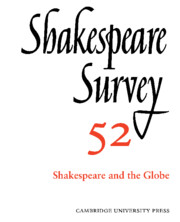Book contents
- Frontmatter
- Reconstructions of the Globe: A Retrospective
- ‘Useful in the Year 1999’: William Poel and Shakespeare’s ‘Build of Stage’
- Reconstructing the Globe: Constructing Ourselves
- From Liturgy to the Globe: the Changing Concept of Space
- The Arithmetic of Memory: Shakespeare’s Theatre and the National Past
- Maximal and Minimal Texts: Shakespeare v. the Globe
- William Shakespeare’s Romeo + Juliet: Everything’s Nice in America?
- Which is the Jew that Shakespeare Knew?: Shylock on the Elizabethan Stage
- A Little Touch of Harry in the Light: Henry V at the New Globe
- Gulls, Cony-Catchers and Cozeners: Twelfth Night and the Elizabethan Underworld
- The Globe, the Court and Measure for Measure
- Macbeth and the Antic Round
- Macbeth / Umabatha: Global Shakespeare in a Post-Colonial Market
- When All is True: Law, History and Problems of Knowledge in Henry VIII
- ‘All which it inherit’: Shakespeare, Globes and Global Media
- ‘Delicious traffick’: Alterity and Exchange on Early Modern Stages
- The 1998 Globe Season
- Shakespeare Performances in England, 1998
- Professional Shakespeare Productions in the British Isles January-December 1997
- The Year's Contributions to Shakespeare Studies 1 Critical Studies
- 2 Shakespeare’s Life, Times, and Stage
- 3 Editions and Textual Studies
- Books Received
- Index
‘Delicious traffick’: Alterity and Exchange on Early Modern Stages
Published online by Cambridge University Press: 28 March 2007
- Frontmatter
- Reconstructions of the Globe: A Retrospective
- ‘Useful in the Year 1999’: William Poel and Shakespeare’s ‘Build of Stage’
- Reconstructing the Globe: Constructing Ourselves
- From Liturgy to the Globe: the Changing Concept of Space
- The Arithmetic of Memory: Shakespeare’s Theatre and the National Past
- Maximal and Minimal Texts: Shakespeare v. the Globe
- William Shakespeare’s Romeo + Juliet: Everything’s Nice in America?
- Which is the Jew that Shakespeare Knew?: Shylock on the Elizabethan Stage
- A Little Touch of Harry in the Light: Henry V at the New Globe
- Gulls, Cony-Catchers and Cozeners: Twelfth Night and the Elizabethan Underworld
- The Globe, the Court and Measure for Measure
- Macbeth and the Antic Round
- Macbeth / Umabatha: Global Shakespeare in a Post-Colonial Market
- When All is True: Law, History and Problems of Knowledge in Henry VIII
- ‘All which it inherit’: Shakespeare, Globes and Global Media
- ‘Delicious traffick’: Alterity and Exchange on Early Modern Stages
- The 1998 Globe Season
- Shakespeare Performances in England, 1998
- Professional Shakespeare Productions in the British Isles January-December 1997
- The Year's Contributions to Shakespeare Studies 1 Critical Studies
- 2 Shakespeare’s Life, Times, and Stage
- 3 Editions and Textual Studies
- Books Received
- Index
Summary
we'll want no mistresses;
Good swords, and good strong armours![...]
And fight till queens be in love with us, and run after us.
(The Knight of Malta, 2.5)For at least the last two hundred years, 'race' has functioned as one of the most powerful and yet most fragile markers of social difference. It is one of the great ironies of imperial history that ideologies of racial differences have hardened as a direct response to racial and cultural crossovers; conversely, colonial enterprises have facilitated contact and exchange between people of different ethnicities, religions and cultures. Notions of alterity or exchange thus derive their meaning from one another. Here I want to explore some aspects of this mirrordance on the stages of Shakespeare's time - a time which can be characterized as either the last period in history where ethnic identities could be understood as fluid, or as the first moment of the emergence of modern notions of 'race'.
We are beginning to interrogate the crucial differences between twentieth-century and early modern ideologies of racial and cultural difference. Between the two stand four centuries of colonial relations which profoundly reshaped global relations.
- Type
- Chapter
- Information
- Shakespeare Survey , pp. 201 - 214Publisher: Cambridge University PressPrint publication year: 1999
- 5
- Cited by



